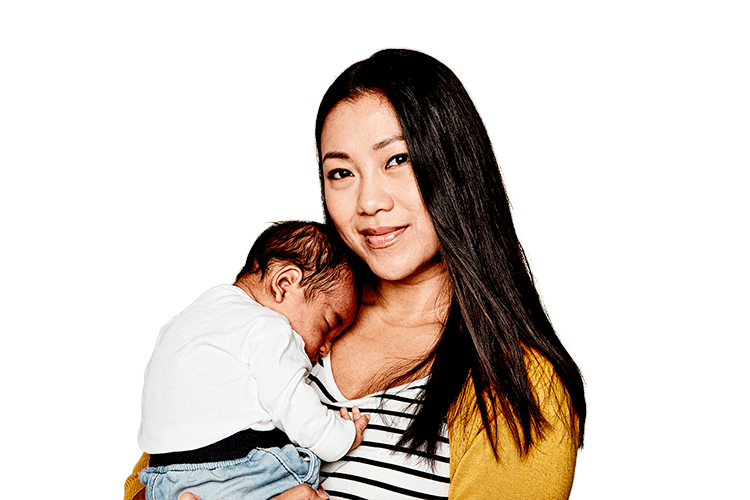Mastitis is a common problem, and one you should be aware of in . In fact, one in five breastfeeding women are affected, and it usually develops in the first three months after giving birth. Knowing the signs and symptoms can help you through your breastfeeding journey.

Mastitis occurs when one of your milk ducts becomes blocked, leading to inflammation, and sometimes infection. And if you’ve ever heard about mastitis from someone who’s experienced it, you’ll know it’s something you’d rather avoid. Find out how to reduce your risk, and how to spot the signs early so you can get treatment before it turns into a painful infection. With a new baby to look after, ain’t nobody got time for that!
MORE: Breastfeeding. Advice on getting started.
How do I prevent mastitis?
Thankfully, there are some simple things you can do to prevent mastitis.
- Feed frequently: A new baby normally feeds to 8-12 times in 24 hours. Don’t skip or delay feeds.
- Position and attachment: If your baby is in position and attached properly, it will reduce your risk of a blocked milk duct. Your maternal child health nurse or a lactation consultant can help you get it right.
- Practice good hygiene: Always wash your hands before touching your breasts or after a nappy change.
- Relieve full breasts: If your breasts are feeling too full, wake your baby for a feed.
- Alternate breasts: Start each feed with the alternate breast, this will ensure each breast is drained every second feed. Keeping a log of which breast you start on can be helpful, especially if you are sleep-deprived.
- Avoid pressure: Wear loose, comfortable clothing. A bra that is properly fitted is important.
- Rest up: It’s not always easy with a new baby, but giving your body time to rest is important. Try to rest while your baby sleeps, and ask friends and family to help out around the home.
I think I have a blocked milk duct? What should I do?
Even if you follow all the rules, there is chance you may still experience mastitis. It usually starts with a sore, red area on your breast. It can feel hot to touch, or look shiny. Some women start to experience flu-like symptoms, for example, feeling achey or feverish. These symptoms can come on quite suddenly.
If you are worried at all that you may have mastitis, you should see a doctor, maternal and child health nurse or lactation consultant as soon as possible. It doesn’t take long for mastitis to escalate quickly. And some cases of mastitis will need treatment with antibiotics to clear. However, there are some things you can do yourself if you suspect you have mastitis.
- Don’t stop feeding: If anything, feed more, especially on the breast that’s feeling sore. The milk is still safe for your baby and your baby’s sucking can help to clear the blockage.
- Apply heat and cool packs: Icing the area can help to relieve swelling in-between feeds, while a heat pack just before a feed can help your milk to flow and unblock your milk ducts.
- Pain relief: Paracetamol and ibuprofen are safe to have when your breastfeeding, and can help get you through.
- Look after yourself: Drink plenty of water – up to two litres a day. And get as much rest as possible.
- Massage: Massaging any lumps towards the nipple when feeding or expressing, or while in a warm shower or bath can help.
When to get help
If you think you might be experiencing mastitis, it’s important to get onto treatment straight away. Your GP or maternal child and health nurse is a good place to start. Mastitis can progress quickly if left untreated, so even if you’re unsure, err on the side of caution. The sooner you get treatment, the quicker it will be resolved.
Need a little extra support?
Health Concierge
Eligible members with hospital cover can now talk to a member of our Health Concierge team for advice and guidance on how to have a healthy pregnancy, at no extra cost on 1800 789 414.#
Got a health question? 24/7 Medibank Nurse Support
Medibank health insurance members can chat to a registered nurse over the phone or online to discuss any health questions or concerns at no extra cost.~ Chat online or call 1800 644 325 24 hours a day, 7 days a week.
24/7 Medibank Mental Health Support
Medibank members with health insurance can talk with a mental health professional over the phone or online in relation to any mental health or emotional concern at no extra cost.~ Log in or call 1800 644 325, 24 hours a day 7 days a week.
Looking for something else?
Visit Medibank Planning, Pregnancy and Parenting for a range of tools and advice to help you at every stage of your pregnancy journey.
Help the way you want it
Contact us
Call us on 134 190 to speak to a consultant. Alternatively, chat to us 24/7 online.
Self-service options
Login to MyMedibank or Download the MyMedibank App for self service options.
Find a specialist
Find a specialist or Member's choice hospital using our find a provider tool.

Things you should know
~ Some referred services may involve out of pocket costs and waiting periods may apply.
# Health Concierge is available to all eligible Medibank members who hold hospital cover. Excludes Overseas Visitor Health Cover, Working Visa Health Cover and Overseas Student Health Cover (OSHC). Some referred services may involve out of pocket costs.
While we hope you find this information helpful, please note that it is general in nature. It is not health advice, and is not tailored to meet your individual health needs. You should always consult a trusted health professional before making decisions about your health care. While we have prepared the information carefully, we can’t guarantee that it is accurate, complete or up-to-date. And while we may mention goods or services provided by others, we aren’t specifically endorsing them and can’t accept responsibility for them. For these reasons we are unable to accept responsibility for any loss that may be sustained from acting on this information (subject to applicable consumer guarantees).